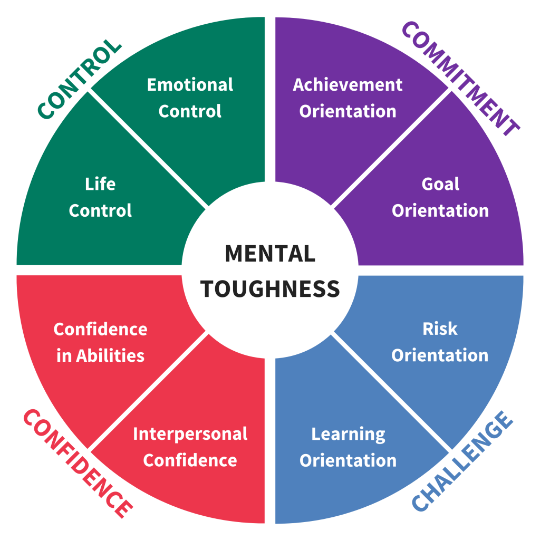Mental toughness is a moderately plastic personality trait which determines in large part how individuals respond mentally to: stress, pressure, opportunity and challenge.
Research shows that mental toughness scores correlate closely with performance; well-being; positive behaviour and aspirations. It has a significant impact on most key outcomes in the world of work. It applies to leaders and staff, and has universal benefits

The 4 dimensions
The test measures the following 4 dimensions (4Cs):
Mental toughness
Test & Coaching portfolio
MTQLite
- Overall Mental Toughness. Predominantly for research.
MTQ4Cs
Possibly entry level measure. A shorter (circa 24-item) measure which provides reliable scores for:
- OVERALL MENTAL TOUGHNESS
- THE 4CS
- PURPOSE: RESEARCH. A SURVEY TOOL FOR LARGE-SCALE APPLICATIONS (E.G. ASSESSING MENTAL TOUGHNESS OF A WHOLE WORKFORCE).
MTQ48
Current 48-item measure providing scores for:
- Overall mental toughness
- The 4 Cs + 4 scales/factors
MTQPLUS
A 68-item measure which provides scores for:
- OVERALL MENTAL TOUGHNESS
- THE 4 CS
- 8 SCALES/FACTOR
- PURPOSE: ASSESSING STAFF – ALL LEVELS.
- Coaching
Individual coaching
Measuring and developing an invidual's mental toughness
- MTQ test
- Individual feedback
- Coaching kick-off
- Coaching process
- Coaching closing session
Group coaching / training
Measuring and developing a group"s mental toughness
- MTQ test
- Individual feedback
- Group coaching / training kick-off
- Development process
- Closing session
Team coaching
Improving team effectiveness
- MTQ test
- Individual and group feedback
- Coaching contract
- Team coaching
- Team coaching closing session
Based on research we can say that the mentally tough people are more likely to be successful than the mentally sensitives peers.
